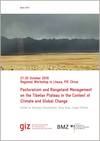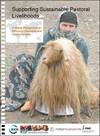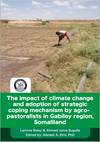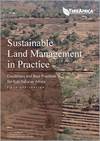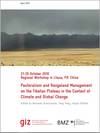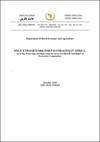This publication contains the keynotes and case studies that were presented in the plenary sessions of the regional workshop on pastoralism and rangeland management in the Tibetan Plateau in the context of climate and global change. With this publication, the authors attempt to reach a wider readership that has an interest in the changes, challenges and transformations in pastoralism and rangeland management. Some of the key concepts, designs for modernisation and aims for the immediate future in the rural areas of the Tibetan Plateau are presented here in a concise and easily approachable manner by leading experts in the respective fields.
Year of publication: 2011Organization: German Agency for International Cooperation (GIZ)
Topic: Climate change, Environmental services, Land, Resilience, Value addition
Language: English
Type of document: Technical
Geographical coverage: Central Asia, South Asia
These guidelines have been prepared to help decision makers, who may not work routinely on pastoralist issues, to make better decisions over policies and investments that impact on pastoralists and their environments. They are intended to simplify complex or disputed issues into more operational basics. The guidelines have also been designed to help development and conservation experts to familiarise themselves with the principles underlying pastoralism as well as some of the opportunities and constraints to sustainable development.
Year of publication: 2011Organization: International Union for Conservation of Nature (IUCN)
Topic: Economy, Environmental services, Food security, Land, Organization, Participation, Social services
Language: العربية, 漢語, English, Français, Русский, Español
Type of document: Technical
Geographical coverage: Global
Despite worldwide coverage of climate change impact, there is inter and intra-sectoral variation in vulnerability depending on location, adaptive capacity and other socioeconomic and environmental factors. In Somaliland, adverse impacts of climate change include recurrent droughts, increased biodiversity loss, species migration and encroachment of invasive plants, increased rural urban migration, changes in the vegetation types, soil fertility loss, and increased infestation of crop by pests and diseases and increased health risks.
This publication presents case-studies documented by Candlelight for Health, Education and Environment, focusing on how climate change is impacting the pastoral communities and environment as a whole in the different ecological zones of Somaliland.
Year of publication: 2011Organization: Individual authors
Topic: Climate change, Resilience
Language: English
Type of document: Technical
Geographical coverage: Eastern Africa
These guidelines for best sustainable land management technologies and approaches are made for practitioners, managers, policymakers, planners, together with financial and technical institutions and donors. They are divided into two main parts. Part 1 highlights the main principles behind sustainable land management, and what considerations are important for technologies and approaches to qualify as ‘best practices’ suitable for upscaling. Part 2 presents twelve groups of sustainable land management technologies as well as a section on sustainable land management approaches. The focus is, in particular, on those practices with rapid payback and profitability and/or other factors that drive adoption.
Year of publication: 2011Organization: Food and Agriculture Organization of the United Nations (FAO), World Overview of Conservation Approaches and Technologies (WOCAT), TerrAfrica
Topic: Land
Language: English, Français
Type of document: Technical
Geographical coverage: West Africa, Central Africa, Eastern Africa, Southern Africa
"We, the women pastoralists gathered in Mera, India, from November 21-26, 2010, representing 32 countries, have met to strengthen alliances and forward practical solutions to issues that affect us."
"We present this declaration as a guiding political document to inform and support the development of pastoralist policies."
Year of publication: 2010Organization: Individual authors
Topic: Gender and youth, Participation
Language: English, Français, Español
Type of document: Policies and legislation
Geographical coverage: Global
The regional workshops within the mountain development programme of InWEnt aim at addressing pressing problems of mutual interest among the participating partners by focusing on a specific topic. In 2010 two conferences on pastoralism were held in the framework of the mountain development programme. Complementing the series that started with the Khorog and Kashgar workshops in July the Lhasa gathering happened to be the final part with a special focus on pastoralism and rangeland management on the Tibetan Plateau. It seems to have been the appropriate timing to emphasize upon a pressing issue that is generating increased and rejuvenated interest in the debates on biodiversity, climate and global change. Planners are challenged by designing concepts for nature protection and resource management in order to implement “green policies”. Decision-makers keep in mind the dual challenges between livelihood improvement and natural resource management by translating and transferring it into modernisation programmes. Far-reaching policies that aim at a reconciliation between ecological necessities and economic demands are tested and implemented in a grand design. Especially the Tibetan Plateau is an arena where the term eco-shelter has become a specific meaning that is affecting the reconciliation between nature and society as well as leading to far-reaching transformations in settlement structures and economic strategies. Recent interventions have changed and modified pastoral practices, terminated and extinguished certain traditions and opened-up new hitherto unknown and unexpected opportunities for pastoralists on the Tibetan Plateau. On the vast Tibetan Plateau pastoralism and rangeland management are not only challenges for regional planning, both sectors offer a tremendous economic potential and are proof for the adaptive properties and resilience of pastoralists exposed to harsh environmental conditions and all kinds of changes.
Year of publication: 2010Organization: Individual authors
Topic: Climate change
Language: English
Type of document: Technical
Geographical coverage: Central Asia
The Policy Framework for Pastoralism in Africa is the first continent-wide policy initiative which aims to secure, protect and improve the lives, livelihoods and rights of African pastoralists. The policy framework is a platform for mobilizing and coordinating political commitment to pastoral development in Africa, and emphasizes the need to fully involve pastoralist women and men in the national and regional development processes from which they are supposed to benefit. The framework also emphasizes the regional nature of many pastoralist ecosystems in Africa and therefore, the need to support and harmonize policies across the Regional Economic Communities and Member States.
Year of publication: 2010Organization: The African Union – Interafrican Bureau for Animal Resources (AU-IBAR)
Topic: Food security, Indigenous peoples, Organization, Participation, Social services
Language: English
Type of document: Policies and legislation
Geographical coverage: North Africa, West Africa, Central Africa, Eastern Africa, Southern Africa
The purpose of this paper is to review demographic trends as well as settlement and service provision patterns using quantitative data, where possible, and drawing on experiences, evidence and lessons from the Horn and East Africa regions. It addresses some of the most salient issues around pastoral livelihoods, emphasising the need to improve understanding in efforts to promote the resilience of these livelihoods. This study recognises the complexity of the issues and does not aim to provide answers, but rather to highlight issues and pose questions that policy makers, politicians and other key stakeholders need to grapple with in order to put into practice measures to reduce risk and mitigate vulnerability.
Year of publication: 2010Organization: Oxfam
Topic: Resilience, Social services
Language: English
Type of document: Technical, Scientific
Geographical coverage: Eastern Africa


